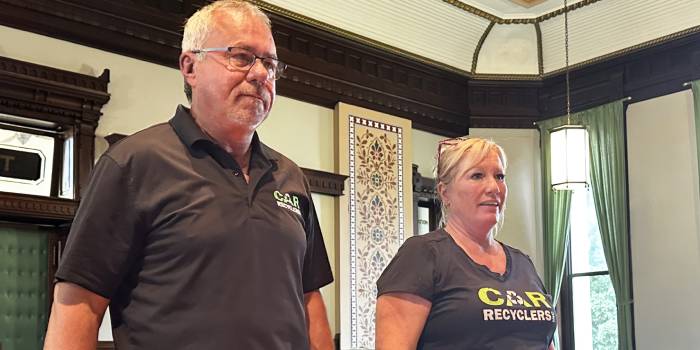“May they always remind us of the history and presence of the Potawatomi and Miami,” said Amber Falcón of a new sign honoring the tribes in The Depot in Goshen. Photo from Mennonite Central Committee Great Lakes.
GOSHEN — A historic trail sign honoring the Potawatomi and Miami peoples was unveiled Friday morning at The Depot in Goshen, marking a step toward recognizing and preserving Indigenous history in northern Indiana.
The sign, located at 1013 Division St., is part of a broader effort by the volunteer Potawatomi Miami Trail Group to memorialize a 145-mile trail once used by Indigenous communities. The Mennonite Central Committee, which hosted the event and serves as the group’s fiscal sponsor, joined community members, local leaders, and volunteers to celebrate the unveiling.
The trail, once a key route through Elkhart County and beyond, was used for generations by Indigenous peoples and was later traveled by European settlers. Much of the original path now lies beneath modern infrastructure, including parts of SR 33.
Luke Gascho, executive director of the Merry Lea Environmental Learning Center and a founding member of the trail group, said historical survey maps and journals have helped identify the trail’s precise path. He described it as a foot trail that likely supported travel with the help of dogs, long before horses arrived in the region.
Gascho noted that remnants of the trail are visible throughout the area — from Benton Mennonite Church to Goshen Airport and downtown Goshen, even passing beneath the current mayor’s office and diagonally across the Elkhart County Courthouse lawn.
The trail continues north toward Niles, Mich., and west toward Chicago. It also crosses Anabaptist Mennonite Biblical Seminary property, which contains the longest walkable section of the original trail. A spur from that area leads to the Sherman Street Bridge in Elkhart, historically used for launching canoes on the St. Joseph River. Gascho noted that a modern-day Department of Natural Resources boat access site now sits at the same location.
The trail marker unveiled Friday, May 30 features a logo created with input from members of both the Potawatomi and Miami nations. It incorporates the Miami and Potawatomi medicine circles, floral and ribbon motifs, and the image of a turtle symbolizing Turtle Island, a name used by some Indigenous groups for North America.
The names “Bodéwadmi” in Potawatomi and “Myaamia” in Miami appear in large text on the sign, reflecting the preferred spellings and pronunciations of the nations themselves. While graphic artists from the tribes were unable to create the design directly, they reviewed and approved the final version.
The Indiana State Senate passed a resolution in January officially recognizing the trail as a historic route, following efforts by Gascho and fellow advocate Rich Meyer in collaboration with State Sen. Blake Doriot.
At the ceremony, Amber Falcón, a board member at The Depot, offered a blessing for the sign and the land it honors.
“May they always remind us of the history and presence of the Potawatomi and Miami,” she said. “May this sign remind us to love all that you love and to seek reparative justice.”
More information about the project can be found at
potawatomi-miamitrail.org.






